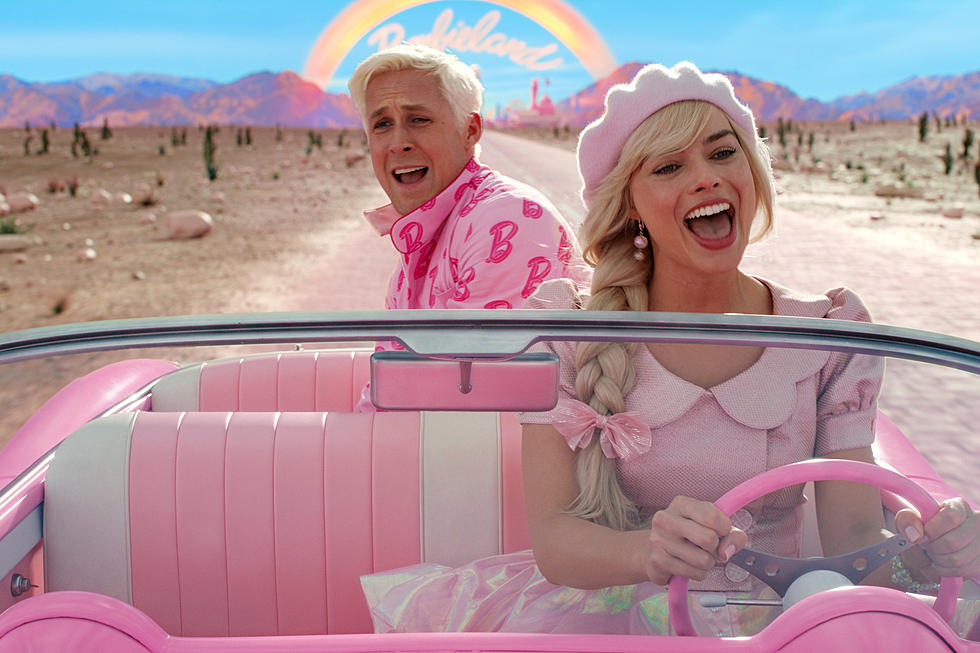
‘Barbie’ Review: Come On Barbie, Let’s Go Have an Existential Crisis
I have two daughters, ages 7 and 5, and they both like Barbie. They play with their small collection of dolls in a DreamHouse my wife found on sale last holiday season. Sometimes other toys make their way in there, too; I recently found a very troubling tableau in the DreamHouse bathroom involving the Fantastic Four. I still think about it.
When I told my kids there was a Barbie movie coming out, they literally gasped with delight. But when I showed them the first trailer for the movie — the one that mostly consisted of a 2001: A Space Odyssey parody where the Moonwatcher was replaced by a dowdy little girl and Margot Robbie’s Barbie played the role of the Monolith — they were totally baffled. Not even the brief glimpse of Barbie’s wildly pink world could quell the onslaught of mortified questions about the little girl in the trailer who smashed her baby dolls to bits. (“Why would she destroy her toys?!?” my youngest repeatedly moaned, clearly traumatized by the sheer concept.)
Barbie itself is basically as advertised. I might have assumed that school kids with interests in fashion and roleplaying would be Barbie’s target audience. I would be mistaken. As its well-earned PG-13 rating suggests, Greta Gerwig’s Barbie is less a movie for girls who like Barbie than it is for women who played with Barbies when they were younger and want to reckon with the doll’s impact on their emotional and psychological maturation. In that sense, it is a far more thoughtful film than anything called Barbie has any right to be; any parent who has endured one of the Barbie TV shows or DTV movies currently streaming on Netflix is in for a rude awakening if they’re expecting something along the same cheerfully uncomplicated lines. But little Barbie fans hoping for something akin to a live-action version of one of those earlier Barbie brand extensions may find a baffling experience that mostly goes over their heads.
I suspect that audience will like the first act best, even though those scenes are largely there to set the table for all of the satire and social commentary to come. This sequence take place in “Barbieland,” which is essentially the ultimate fantasy of my 5-year-old “fashionista.” (This is what she tells me she wants to be when she grows up! I’m already worried!)
In Barbieland, Barbie (Robbie) lives an idyllic existence with many other Barbies, each with their own specialty or job (including Alexandra Shipp’s Writer Barbie, Emma Mackey’s Physicist Barbie, Nicola Coughlan’s Diplomat Barbie, and Issa Rae’s President Barbie). Each Barbie lives in their own enormous and impressively detailed DreamHouse. Barbieland’s production design by Sarah Greenwood is whimsical and hilarious; kids (and the parents who routinely clean up their toys) will recognize the attention to detail and the idiosyncratic architecture. (Each DreamHouse has translucent pink plastic doors, and a fridge stocked with decals of food.)
Orbiting around the Barbies at the fringes of Barbieland, adoring them in the slightly confused way that only a doll with no genitals can, are the Kens: Kingsley Ben-Adir, Simu Liu, Scott Evans, Ncuti Gatwa, and most importantly Ryan Gosling’s hunky, bleached blonde “Beach Ken,” who desperately craves attention from Robbie’s Barbie and wants to be invited to a sleepover at her DreamHouse, although he openly admits he isn’t entirely sure what they would do during one.
READ MORE: The Weirdest Batman Toys Ever
Even with that occasional dating-related awkwardness, everything in Barbieland is simple and pink and fun. And because, as Helen Mirren’s droll narrator tells viewers, Barbie can be anything, women in the real world can now be anything, too. Whew; glad we finally got that whole gender parity problem sorted out!
Or not. The gap between Barbieland’s fantasy of empowered women and the real world’s ugly truth begins to infect the previously unblemished psyche of Robbie’s Barbie (who is often referred to as “Stereotypical Barbie”). Out of nowhere, this Barbie will interrupt a synchronized dance party to ask whether the other toys have ever contemplate the looming specter of death.
A “Weird Barbie” (Kate McKinnon) with chaotic makeup informs Barbie that someone who is playing with her in the real world is sad, and her sadness is now somehow infecting her toys: Turning Barbie’s perfectly arched feet flat, giving her a first cellulite dimple, and so on. Barbie’s only hope of restoring herself to her previously unspoiled existence, Weird Barbie explains, is to travel to the real world, find this sad girl, and sort of work through their issues together.
Once Barbie (and Gosling’s Ken) are in the real world, though, they attract the ire of the CEO of Mattel, the manufacturer of Barbie dolls (not to mention the producers of this very Barbie movie). This unnamed CEO (Will Ferrell) warns that if he and his corporate minions don’t catch Barbie and Ken and return them back to Barbieland, there could be extremely bad but undefined consequences for both worlds.
Hopefully my plot description conveys how little Gerwig, who co-wrote Barbie with her partner Noah Baumbach, cares about the mechanics of Barbieland and its sentient doll residents. She’s far more interested in what it all means: What Barbie represents to generations of women, and whether she is a force for good or a reflection of negative stereotypes; whether she inspires girls to dream big or whether she burdens them with impossible expectations of themselves.
The answer, in life as in Barbie, is somewhere in the middle — and it’s to Gerwig’s credit that she managed to make a Barbie movie approved by Mattel that actually considers the ramifications of these questions, alongside subplots about feminism, patriarchy, and toxic masculinity. This is a big swing of a movie, one that tries to tackle the big questions about Barbie, and to use them to say something about gender roles in society now. It is not just a lavish commercial for Barbie dolls.
But it is still kind of a lavish commercial for Barbie dolls, and other products as well. (A car chase involving Mattel goons is shot like an ad for Chevy — and sure enough, footage from it is currently airing as part of a new commercial for the 2024 Chevy.) For Gerwig, an immensely talented filmmaker with a strong point of view, telling this story in this way was a bit of a double-edge sword. (Is there a Barbie that comes with a sword?)
On the one hand, if Gerwig had made a satire about a popular and iconic girls fashion doll named, I dunno, “Bambi,” the jokes would have far less bite, because they would be made at a remove from Mattel’s self-important marketing and the company’s more bizarre dolls through the years (Yes, those shocking Ken dolls that pop up in Barbie really happened.) On the other hand, making an officially licensed Barbie movie means for all its speeches about what it really means to be a powerful woman, the film also exists the promote the machine it is designed to spoof.
Margot Robbie’s Barbie is yet another immensely likable yet deeply confused Greta Gerwig protagonist searching for her identity (see also: Lady Bird, Little Women — which would also be a pretty good title for a Barbie movie, come to think of it).
But the real star of the show, somewhat paradoxically given the film’s themes, is Ryan Gosling — who turns his oafish, self-centered man-child into a figure that is equally comic and tragic, and sometimes both simultaneously. It’s a performance of enormous nuance — and he’s literally playing a buff, bumbling Ken doll. That is a true feat of acting. (Ferrell, surprisingly, is the big weak spot in the film; he is mostly wasted in a role that he’s played a few times before, including in another subversive toy-based satire.)
All told, Barbie is a fascinating movie, even if it is occasionally a little frustrating and often more fun to look at than it is laugh-out-loud funny. I think my daughters will probably enjoy it quite a bit — when they watch it when they’re a few years older.
RATING: 7/10



